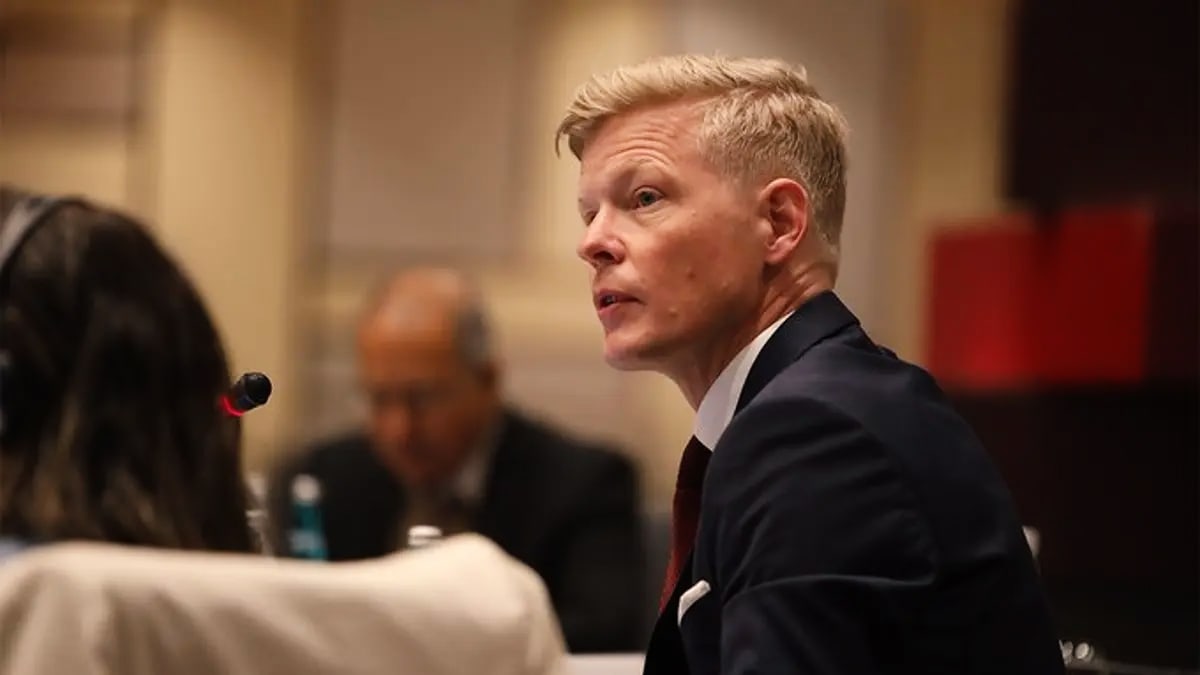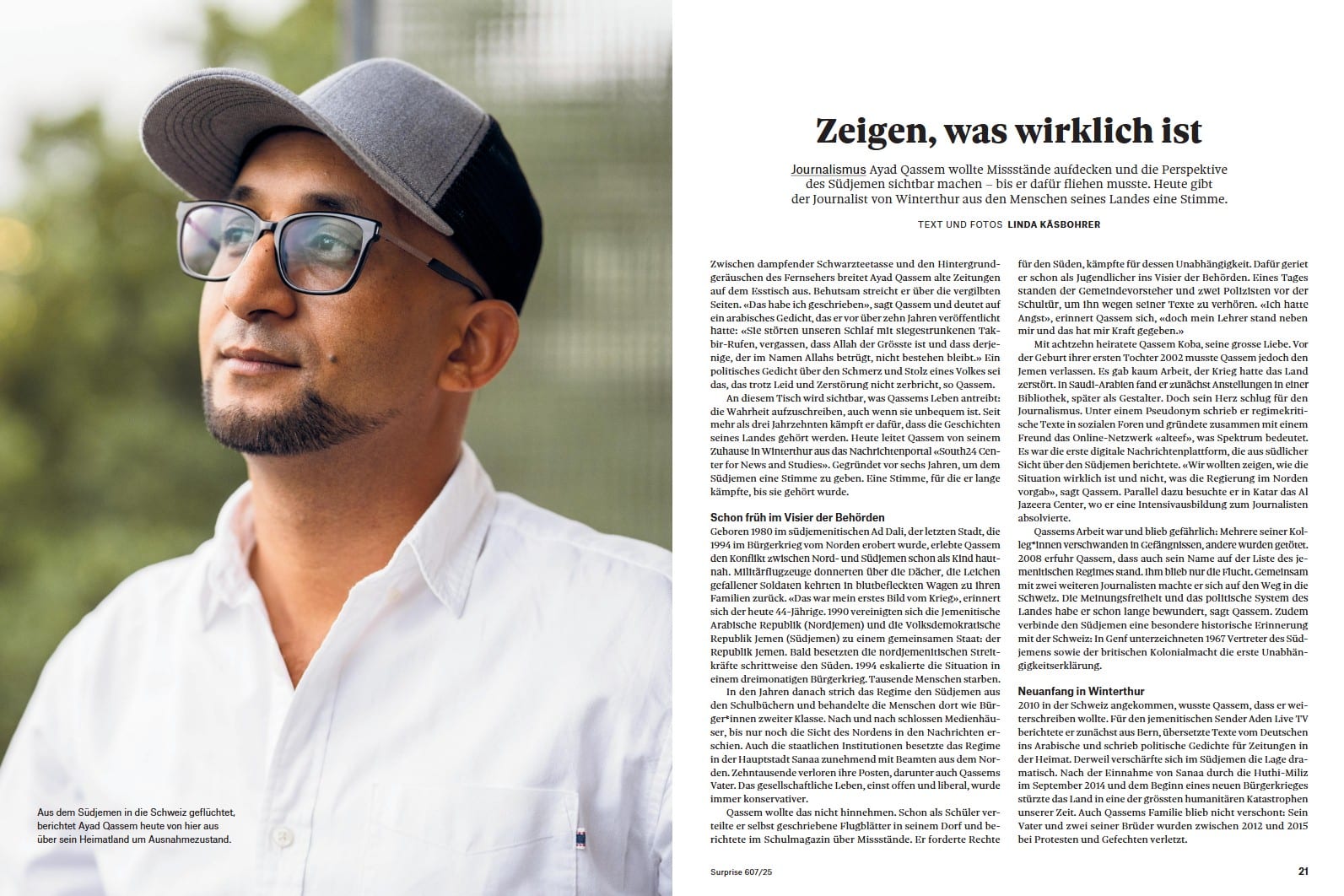
UN Envoy to Yemen Hans Grundberg (Twitter)
آخر تحديث في: 03-08-2022 الساعة 3 مساءً بتوقيت عدن
Aden (South24)
The United Nations Special Envoy to Yemen, Hans Grundberg, announced yesterday that the parties in Yemen had agreed to extend the humanitarian truce in the country for two additional months until October the 2nd, one hour after the truce expired on August the 2nd.
"I am pleased to announce that the parties have agreed to extend the truce, under the same terms, for an additional two months, from the 2nd of August 2022 until the 2nd of October 2022. This truce extension includes a commitment from the parties to intensify negotiations to reach an expanded truce agreement as soon as possible," the Swedish diplomat said.
He added, "I will also intensify my efforts with the parties to reach as soon as possible an expanded truce agreement. I have shared with the parties a proposal for an expanded truce agreement, and I have received from both sides substantive comments on this proposal."
The truce was extended for two additional months on June the 2nd, to complete four months by August the 2nd. The Yemeni government welcomed the truce extension, in a statement published by the state-run Saba news agency.
In the first official Houthi comment on the extension, the Houthis' official spokesman and head of its negotiating delegation, Mohammad Abdul Salam, said: “With the efforts of the brothers in the Sultanate of Oman, which provided the opportunity to extend the truce, we reiterate the importance of the United Nations intensive work on disbursing salaries, opening airports and ports, and ending the siege".
An informed political source told "South24", on Monday, that the parties in Yemen agreed to extend the truce. According to the source, the dispute was over the extension of the truce for two months, as happened the previous time, or 6 months, as the United Nations seeks.
The source stated that Grundberg presented an expanded truce proposal that included additional items, including the formation of an economic committee for several tasks.
The expanded truce proposal faltered
With the announcement of a two-month extension of the truce under the same terms, it is clear that Grundberg's expanded truce proposal has faltered.
According to the political source, the Houthis adhered to a major condition for approval of this proposal, which is the Yemeni government's commitment to pay the salaries of civilians and retirees in areas of the latter's control. The Presidential Council, however, linked this request to another condition, which is the collection of revenues from the Houthi-controlled ports of Hodeidah to the central bank in Aden.
In a telephone conversation with the US Secretary of State on July 31st, the Chairman of the Presidential Council, Rashad Al-Alimi, expressed the Council’s keenness to “pay the salaries of civil servants in all the country, provided that the Houthis are committed to supplying all revenues of Hodeidah ports for this purpose,” according to the official Saba Agency.
Meanwhile, multiple Saudi journalists close to Saudi Ambassador to Yemen, Mohammad Al Jaber, spoke about Al-Alimi’s refusal to meet with the UN Envoy Hans Grundberg in Aden a few days ago to denounce the absence of a clear position from the United Nations regarding Houthi violations of the truce and their disavowal of commitments.
According to Saba Agency, a meeting of the Presidential Council in Aden on July 30th discussed a proposal submitted by Grundberg through the Yemeni Foreign Minister, Ahmed bin Mubarak, on extending the truce.
On Monday, the UAE-based newspaper Al-Bayan, reported Yemeni officials that the new truce draft submitted by the Swedish diplomat already provides for an extension of the truce for 6 months, and the allocation of Hodeidah port revenues to contribute to the payment of all salaries of civil servants and retirees in Houthi areas.
According to the newspaper, the Houthis insists on charging the Yemeni government the full cost of paying the salaries of employees in its areas of control, in light of the failure of the international community to persuade the Houthis to open one of the main roads to the city of Taiz.
In the UN statement, Grundberg revealed some features of his proposal for an expanded truce. The Swedish diplomat said: "The expanded truce proposal would provide for reaching an agreement on a transparent and effective disbursement mechanism for the regular payment of civil servant salaries and civilian pensions, the opening of roads in Taiz and other governorates, opening additional destinations to and from Sana’a International Airport, and providing fuel and its regular flow of fuel to the ports of Hudaydah".
An expanded agreement would also provide an opportunity to negotiate a nationwide ceasefire, humanitarian and economic issues, and to prepare for the resumption of the Yemeni-led political process under UN auspices to reach a sustainable and just peace," he added.
Omani role
Two days after arriving in Sanaa, a delegation from the Sultanate of Oman departed the Houthi-controlled city yesterday according to Mohammad Abdul Salam who accompanied the delegation on their visit and has been residing in the Omani capital, Muscat for years.
According to senior Houthi official, the Omani delegation discussed with the group in Sanaa "the proposals of the UN Envoy to extend the truce and address humanitarian and economic issues."
A phone call between the Omani Foreign Minister, Badr Albusaidi, and his US counterpart Anthony Blinken on July 30th, had discussed - according to the Omani Foreign Ministry - efforts to maintain the truce in Yemen "to enhance chances of achieving peace and stability" in the country.
Houthis disavow
Although the Houthis obtained a number of demands that came within the terms of the UN truce, such as operating flights from Sanaa airport and opening the ports of Hodeidah to receive fuel and food, the Houthis did not, in return, implement any of the terms that fall upon it, foremost of which is the opening of main roads.
Negotiations led by Grundberg in Muscat a few weeks ago failed to make any progress in the file of opening roads as one of the main provisions of the truce due to the intransigence of the Houthis. In addition to the faltering opening of roads, the file of the mutual release of prisoners between the Yemeni government and the Houthis faltered.
Grundberg had expressed his regret that the parties did not agree on the release of detainees, in a statement released by his office, on Monday, with the conclusion of the sixth meeting of the supervisory committee for the implementation of the prisoner exchange agreement.
At the same time, Houthi media published pictures of unprecedented military parades in Sanaa which included thermal missiles and drones, in addition to armored vehicles and heavy vehicles.
#Sanaa
— South24 | English (@South24E) August 1, 2022
Hours before the end of the second truce, Houthi rebels carry out a military parade that includes drones and combat armored vehicles in Sanaa
#south24 pic.twitter.com/If43q5uwAP
Political analyst and editor-in-chief of "Al-Youm Althamen" newspaper, Saleh Abu Awdal, believes that the aforementioned truce "revealed the weakness of the Presidential Council."
Abu Awdal told South24: "The weakness and division of the Presidential Council is what prompted the Houthis to demand more concessions and even set impossible conditions through the group's demand for a share of Hadramout and Shabwa oil."
Although the truce has already been extended again, it seems that the specter of war still hangs over the air. Just hours before the truce ends, the Sarwah front in Marib, North Yemen, witnessed clashes between the Houthis and pro-government forces in which the pro-government Security Director in Marib, Abdullah al-Jahmi, was killed, according to local media.
The violations that accompanied the truce over the past months, especially by the Houthis, make it difficult to guarantee the continuation of any upcoming truce. Yesterday, the Southern Forces announced that 22 civilians and soldiers were killed and 101 others wounded during the truce, by Houthi fire, on the -Dhalea front.
On the other hand, the group accuses its local opponents and the Saudi-led Coalition of committing similar violations on different fronts and regions.
South24 Center
الكلمات المفتاحية:

قبل 3 أشهر

قبل 3 أشهر